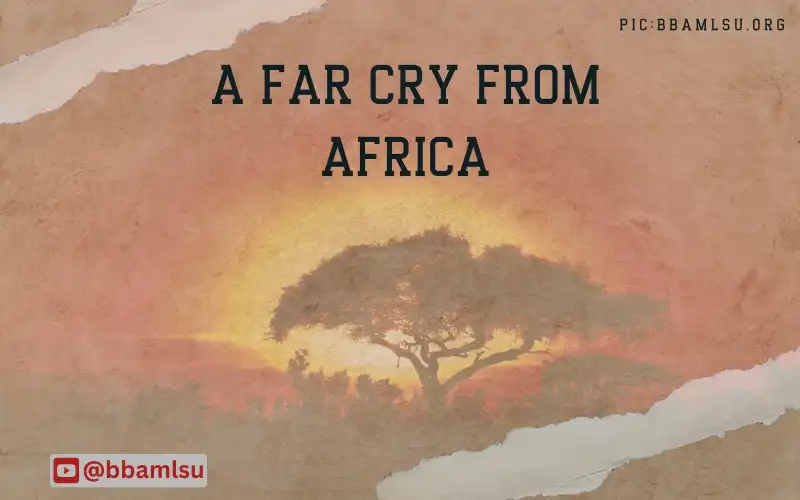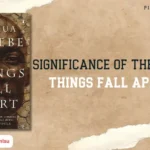Chinua Achebe’s “Things Fall Apart,” published in 1958, is a seminal work in postcolonial literature, often regarded as a crucial text for understanding the complexities and contradictions of colonial impact on African societies.
The novel is set in the Igbo village of Umuofia in Nigeria and follows the life of Okonkwo, a respected leader, and wrestler, as he navigates the changes brought about by British colonialism and Christian missionaries.

Historical Context and Narrative Structure
Achebe’s narrative is rooted in the historical and cultural context of pre-colonial Nigeria, which serves as a canvas to depict the encounter between indigenous African traditions and European colonialism.
The novel begins by meticulously depicting Igbo life, customs, and social structures, providing a rich and nuanced portrayal of the community. Achebe’s use of Igbo proverbs, folklore, and language within the English text emphasizes the cultural richness and complexity of the Igbo people.
As Achebe himself notes in the introduction to the 2001 edition of –
“Things Fall Apart,” his aim was to “help my society regain belief in itself and put away the complexes of the years of denigration and self-abasement” (Achebe, 2001).
The Theme of Cultural Clash and Identity
One of the central themes in “Things Fall Apart” is the clash between traditional African culture and the forces of colonialism.
This theme is embodied in the character of Okonkwo, whose personal downfall mirrors the disintegration of Igbo society. Okonkwo represents the traditional values of masculinity, strength, and self-sufficiency, and his life is governed by the rigid structures of Igbo society.
However, the arrival of the British disrupts these structures and introduces new religious, economic, and political systems that challenge the very fabric of Igbo life.
Achebe illustrates this clash through various symbols and events, such as the introduction of Christianity and the colonial judicial system, which undermine traditional Igbo beliefs and authority.
The character of Nwoye, Okonkwo’s son, symbolizes the internal conflict that arises from this cultural collision. Nwoye’s eventual conversion to Christianity highlights the generational divide and the appeal of new ideologies to those who feel alienated or oppressed by traditional norms.
Achebe portrays this transformation as both a personal and societal loss, suggesting the deep and often painful impacts of colonial influence on indigenous cultures. As Nwoye reflects on the new religion, he finds solace in the compassion and hope it offers, in stark contrast to the rigidity and violence of his father’s world:
“He felt a relief within as the hymn poured into his parched soul. The words of the hymn were like the drops of frozen rain melting on the dry palate of the earth” (Achebe, 1958).
Critique of Colonialism and its Impacts
Achebe’s critique of colonialism is subtle yet profound, revealing the destructive effects of colonial rule on African societies. He does not portray the British colonizers as purely malevolent but rather as part of a complex system that imposes itself on an existing and coherent culture.
Through characters like Mr. Brown and Reverend Smith, Achebe presents a spectrum of colonial attitudes, from the more sympathetic and understanding approach of Mr. Brown to the rigid and intolerant stance of Reverend Smith. This nuanced portrayal avoids simplistic binaries and underscores the multifaceted nature of colonial interactions.
The novel also critiques the economic and political mechanisms of colonialism, which disrupt and exploit indigenous structures. The establishment of colonial courts and the introduction of a cash economy destabilize traditional social and economic relations, leading to the marginalization of those who do not conform to the new order.
This is poignantly illustrated in the trial of Aneto, who is executed by the British for following traditional practices:
“Aneto was one of the men in Umuofia who had refused to become a Christian. He had even fought in the war against the white man. When they captured him, they said they would kill him. So he fled and they burnt his compound” (Achebe, 1958).
Resilience and Adaptation
Despite the tragedy and upheaval depicted in the novel, Achebe also highlights the resilience and adaptability of African societies.
The Igbo people’s willingness to adapt and integrate new elements into their culture, as seen in their acceptance of the kola nut ritual and other customs, reflects a dynamic and evolving society.
This adaptability is a testament to the enduring strength and vitality of African cultures in the face of external pressures.
Achebe’s portrayal of the Igbo community as a complex and sophisticated society counters colonial narratives that often depicted African cultures as primitive or static.
By presenting a detailed and empathetic account of Igbo life, Achebe reclaims the narrative space and asserts the value and integrity of African cultural heritage. This reclamation is a key aspect of postcolonial literature, which seeks to challenge and deconstruct the legacies of colonialism.
Conclusion
“Things Fall Apart” stands as a powerful critique of the colonial encounter and its impact on indigenous cultures. Achebe’s rich and detailed portrayal of Igbo society provides a counter-narrative to colonial discourses that sought to dehumanize and marginalize African peoples.
The novel’s exploration of themes such as cultural clash, identity, and resilience highlights the complexities of the colonial experience and underscores the importance of understanding and valuing diverse cultural perspectives.
Through “Things Fall Apart,” Achebe not only documents the tragedy of colonialism but also celebrates the enduring strength and richness of African cultures, making it a quintessential work of postcolonial literature.
In the words of Achebe, the novel seeks to remind us that “the story of Africa is not the story of the dark side of the moon,” but rather a story of “a rich and complex cultural heritage that has given the world so much” (Achebe, 1989).
This powerful assertion of African identity and dignity is at the heart of “Things Fall Apart” and remains its enduring legacy in the canon of world literature.













